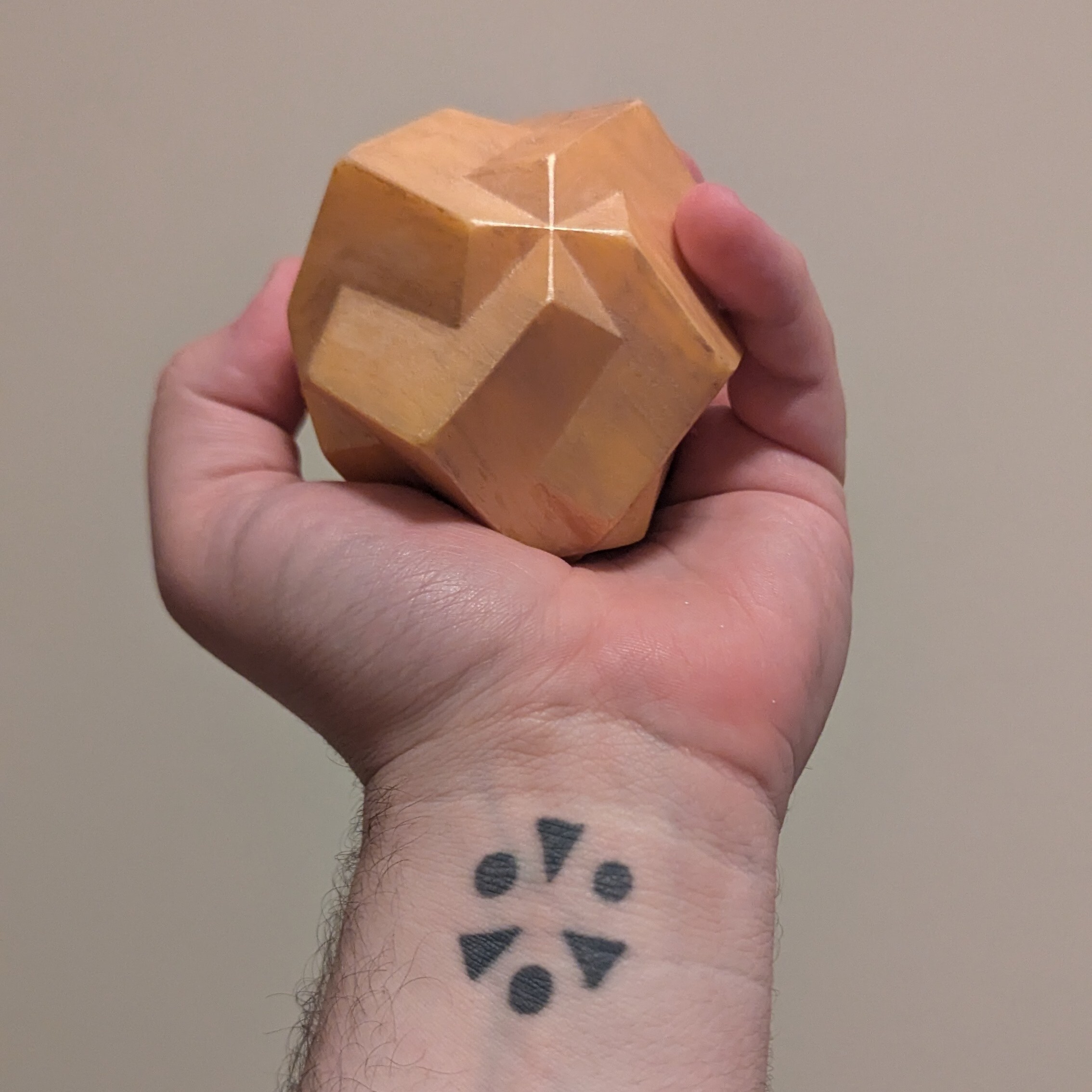What about similar oddities in English?
(This question is inspired by this comic by https://www.exocomics.com/193/ (link found by BunScientist@lemmy.zip))
Edit: it’s to its in the title. Damn autocorrect.
One of my favourites is the word jam, which can mean:
- A fruit preserve
- Traffic that’s stopped
- To play music
- A door that won’t open
- A difficult situation
- To force something in somewhere it’s not supposed to be
- To interrupt a signal
- Something you don’t like or can’t do (“that’s not my jam”)
And probably others, all spelled and pronounced the same way but with wildly different meanings depending on the context.
The other English thing I find super interesting is how there’s a sort of unspoken but very clearly understood order to adjectives. So for example, if I say “The big old red wooden door” it works as a description, but if I say “The wooden old red big door” it sounds weird even though it’s the same information. People aren’t usually formally taught the order (as far as I know), but everyone seems to understand it.
Would be interested in more about the order - wondering if there is a name for that? I have been called out by teachers and friends and colleagues about strange sentences and it was often because I wouldn’t write the ‘normal’ way. I’ve learned the conventions over the years and often find myself making edits to swap words and phrases around to meet expectations.
Apparently it’s called the Royal Order of Adjectives, and it’s essentially: determiner, opinion, size, shape, age, colour, origin, material, qualifier.
You don’t have to use all of those in the description, but that’s broadly the order to use them in to make it sound ‘right’. So for example in the comment I made above, it fits because I used:
- determiner (The)
- size (big)
- age (old)
- colour (red)
- material (wooden)
in that order. I’m sure I was never taught that in any organized way (I just had to look up what it was called lol) but I still got it in the right order anyway just by typing it out in the way that felt right, which I think is interesting.
Welcome to english, where rules are actually the exceptions
I before E, except after C!
As long as you don’t count the word caffeine. Or protein. Or species. Or seize or heinous or leisure or weird or feign or their or reignite or any of the other 923 words that are exceptions to this rule lol.
The meta aspect of ‘shit’ has to be up there.
I found it! https://www.exocomics.com/193/
Nice! Thank you
The English language is so retarded yet we use it for international communication, and it is too late to stop it.
The problem is the spelling, not the language. But the problem with spelling reform is that it necessarily favours certain dialects over others so you can never please everyone.
I’ve never been a fan of read/read/red They’re too popular to all be comingled like that.
Just place read/read with Peruse/Perused
English has way more vowel sounds than it has vowels.
- jack
- barn
- arena
- ball
- able
- rare
Those are just words where the primary vowel letter is “a”.
The terrible attempt to solve this is by using double letters, but then consistency goes out the window. There’s times when “ea” is a single vowel sound like /rid/ (reed) or /rɛd/ (red). But it can also be /ɛrn/ as in earn, which rhymes with urn and burn. It can be /ˈɡɹeɪt/ as in great, where the “ea” is a diphthong and pronounced like the “a” in grate or vague. Or, for more fun, the two letters can each fully get their own pronunciation like “react” or “theatre”.
We’re really at the “bearn it all down and start over” stage with English. Let’s just all agree to switch to español.
The digraph oo is pronounced at least six different ways:
- boot, proof, boost, scoop, moon
- book, foot, look, cookie, good
- floor, poor, door, moor
- flood, blood
- zoology, cooperative
- brooch (just brooch; there doesn’t seem to be any other word in the whole language using this sound for oo).
Are the first 2 lines really different?
Genuine question from a non native speaker.
first line is a long oo, second line is a short oo.
Oh I see it now. Thanks for the explanation
That’s the fun part, depending on your dialect and regional accent, sometimes there is no discernable difference in some of these lines. But each line has distinct pronunciation from each other in some dialects.
Yeah I went through them again and see how it makes a slight difference but I am slavic and you can definitely hear it when I speak especially with my þ, ð and r sounds. The r especially after speaking for more than 15 minutees my tongue just gives up and I cannot make the weird soft english version of it. The probounciations I use are all over the place.
If you want to have some fun with US regional accents , Baltimore is a classic.
https://youtu.be/Esl_wOQDUeE (1min)
Oh the iohn ohn uhhrn irn. That’s a classic
Ehh technically I think they are the same but in common pronunciation they differ subtly. Don’t overthink it though.
Brooch and mooch.
But, aren’t these the same sounds as boot / proof / boost etc.?
Brooch is pronounced like roach
It may be pronounced either way, and may also be spelled “broach”, an alternate spelling which is very common although probably slightly less than this chart implies given multiple meanings of “broach”.
I’m not really informed on this history of this word, but I think it’s possible that the “brooch” spelling increased in frequency along with the pronunciation that rhymes with “mooch” while people who pronounce it to rhyme with “roach” are more likely to spell it as “broach”.
Floor/door and poor might differ depending on dialect
And the whole point of zoology and cooperative is that they aren’t digraphs (hence why some super posh people write coöperative)
“well” is a noun, a verb, an adjective, an adverb and an interjection
Where, were, we’re. Even native speakers have problems with this. I don’t know how many times I had to correct such cases, especially with American authors.
Pretty much only native speakers have problems with this, I see this type of mistake far less frequently with those who learned English as an additional language.
Exactly. People with English as a second language go from meaning to writing. Native speakers go from sound to writing.
There, their, they’re is something native speakers confuse as well. I have only ever observed native speaker write should of instead of should‘ve or should have.
Pretty much only native speakers have problems with this
99% agree with this. This is a native speaker issue, except where someone took up bad habits from the natives…
Pretty much only native speakers have problems with this
That makes no sense since they would use it more, however native speakers from the US do have problems with it, and other words (they’re/their).
Rarely encounter it with others.
Their spelling is embarrassing, same as their very limited vocabulary. IDK what they do in schools.Native speakers acquire the language before learning to read. Remember, writing is a representation of spoken language not the other way round.
No it is. People were speaking for tens of thousands of years before they started writing. Modern people see the written word as more valid than spoken, but it’s a historical quirk that words pronounced identically should be spelled differently in English. Words that are spelled differently in English were once pronounced differently as well, but languages change and our spelling system is frozen in the 1600s.
Modern people are the written word as more valid than spoken
Now there’s a sentence I can’t make sense of.
There is no influence of history in when kids learn to write their language or if they used it orally, they learn to write it then how it’s supposed to be written.
If your reasons were valid every Anglo would have problems, they don’t.
Since it’s noticably the US specifically I can only assume it’s sub standard education.
As confirmed by their poor vocabulary compared to other Anglo’s
That is still not a valid reason.
It’s true that I see it more rarely with the British. I suppose they read more or something.
Possibly, education is my main guess
I pronounce these all differently though? [wɛɹ], [wəɹ] and [wiɹ]
Maybe, yes, but as someone who has seen tons of unedited writings, I can tell you those mixup as common as muck.
This one has also bothered me because I pronounce all three of these differently.
Where, were, we’re.
I never had a problem with those, until I started with stuff like Reddit.
Now, I find myself making the mistake and catching it in proofreading.
Guess my brain is starting to age too.
Words that produce the same sounds should have same spelling. Read in past tense and red is the same sound, so why isn’t past tense of read - red?
Why most ‘c’ in words produce ‘k’ sounds?
Car and kar also produce the same sounds, so why C instead of K?
On a different note there is Reading, a football club in UK, which is pronounced “Redding”. This pronunciation is akin to the Reading Railroad from Monopoly (which I mispronounced all my life until today).
Little details, picked up along the way.
It’s pronounced “Redding” Railroad?? All those times I sang “Take a look, it’s in a book, Reading Railroad!” were a lie!
Reading is a place itself, the football club is the club for that place
Next you’re going to tell me there are places in the UK named Manchester and Liverpool and Notts County and St Johnstone and Celtic and Rangers and Port Vale.
Indeed, I just blurted out the biggest association in my mind to the place
Lead and lead as well. I got a lead on those lead undergarments you wanted. I’ll lead you there later.
How did I get to the lead merchant? I was led here. But in the price negotiation, I took the lead.
That works for your way of saying it but there is nothing wrong with the way I said it. You don’t say I’ll led you there later. My statement wasn’t past tense at all.
Actually I don’t think this one is true. Past tense of “to lead” is led. But also lead can be pronounced like led when referring to the metal or the element.
English pronunciation is weird. It can be mastered through tough thorough thought though.
English a very difficult language















